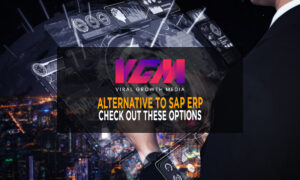Do you still operate a cash register in your company? If so, you might be overlooking the key advantages that cloud-based POS systems have to offer. This blog post will review five advantages of cloud-based POS systems for companies. Learn more by continuing to read!
Businesses can benefit from a variety of advantages over conventional cash registers with cloud-based POS systems. They are more effective, which is maybe the most evident advantage. You may track inventory in real-time using a cloud-based system, which can aid in your decision-making regarding what to keep on your shelves.
A further advantage of cloud-based POS systems is their increased payment flexibility. You can only accept cash and checks with a conventional cash register. But with a cloud-based solution, you can accept mobile payments like Apple Pay and Google Pay in addition to credit and debit cards. Making it more straightforward for clients to pay for your goods or services can help you improve sales.
Businesses can track client data with POS systems that are cloud-based. You can use this information to develop loyalty programs, deliver personalized marketing messages, and more. Tracking this kind of information might be challenging with a conventional cash register. However, gathering and analyzing client data with a cloud-based solution is simple.
Another advantage is that cloud-based POS solutions are frequently cheaper than conventional cash registers. Cloud-based systems are frequently less expensive than their conventional counterparts when hardware, software, and maintenance are considered. In addition, many cloud-based service providers provide flexible monthly or yearly subscription rates.
Finally, cloud-based POS systems offer businesses the ability to scale quickly and easily. If your business is growing, it can be challenging to keep up with the demand if you are using a traditional cash register. However, a cloud-based system can easily add more users or terminals. This can help you to avoid disruptions in service as your business grows.
As you can see, there are many benefits of using a cloud-based POS system for your business. If you are still using a traditional cash register, we encourage you to consider making the switch to a cloud-based system. You may be surprised by how much it can benefit your business!
You can compute and keep track of sales with a cash register. All these procedures are automated by cloud-based point-of-sale systems, making them simpler to operate from a distance.
Are you not yet persuaded? Review some further justifications for why a cloud-based POS system is superior to its predecessor:
1. Access Your Data from Any Location:
A cloud-based POS system allows you to monitor store sales while you’re not there. This is accomplished by always having access to your account data over WiFi. Because you won’t be bound to the actual location, you may feel secure knowing that you can keep connected with your business around the clock.
2. Built-in Sales Reporting:
Tuesday proved to be a busy day, Wednesday was a little slower, and Friday afternoon saw a large rush. Do you think the shelves are empty? You can view your recent and real-time sales data using a cloud-based POS system. You can discover which products are most in-demand with your customers and whether sales are at their highest or during particular hours of the day. Inventory planning will be considerably more straightforward if you know how many of each item you sell.
3. Access to Customer History:
You are pleased to see Jane, a dependable customer, enter your store. While it can be challenging to recall every past purchase made by a regular customer, that won’t be an issue if you use a cloud-based POS system. Another area where the cloud-based POS system outperforms the conventional cash register paradigm.
You may quickly access Jane’s purchasing history on your iPad the next time she visits your shop. You can propose new goods Jane might like by being aware of her preferences and past purchases. Doing this can strengthen your efforts to upsell and raise your company’s total profitability.
4. Streamlined Inventory:
Your outdated register is undoubtedly not helping with inventory management, but maybe you’ve already moved past keeping track of your goods on paper. If you frequently find excess or a shortage of a particular item in your place of business, it could be time to get rid of your register.
A POS system is crucial since automating your inventory management procedures can save you time. You may automate your procedure, so you never have to wonder how much inventory you have on hand by using a portable scanner to speed up the process of physically counting every item in your business. Each transaction will automatically update your inventory. Just sign in, browse your inventory, and pick what needs to be reordered. Reminders that alert you when certain supplies are running low can also be set up.
5. Increased Customer Engagement:
Customer involvement should be one of your top concerns if you want your small business to succeed, especially in competition with larger organizations. And how does that help achieve the purpose of an old cash register? Not at all. Yet another flaw exists in the outdated registers’ performance compared to modern cloud-based systems. Email marketing is one of the finest strategies available for keeping your small business afloat, understanding what clients want, and staying in touch with them after making a purchase. It is quick and conveys a clear message.
Modern POS systems allow you to not only keep track of a customer’s past but you could also receive emails when they make a purchase. You may contact prior customers and maintain contact long after your initial point of contact by gathering this data and combining your system with an email marketing campaign. Send out email newsletters with news, deals, and seasonal information. When was the last time a cash register could facilitate all the tasks above for you?
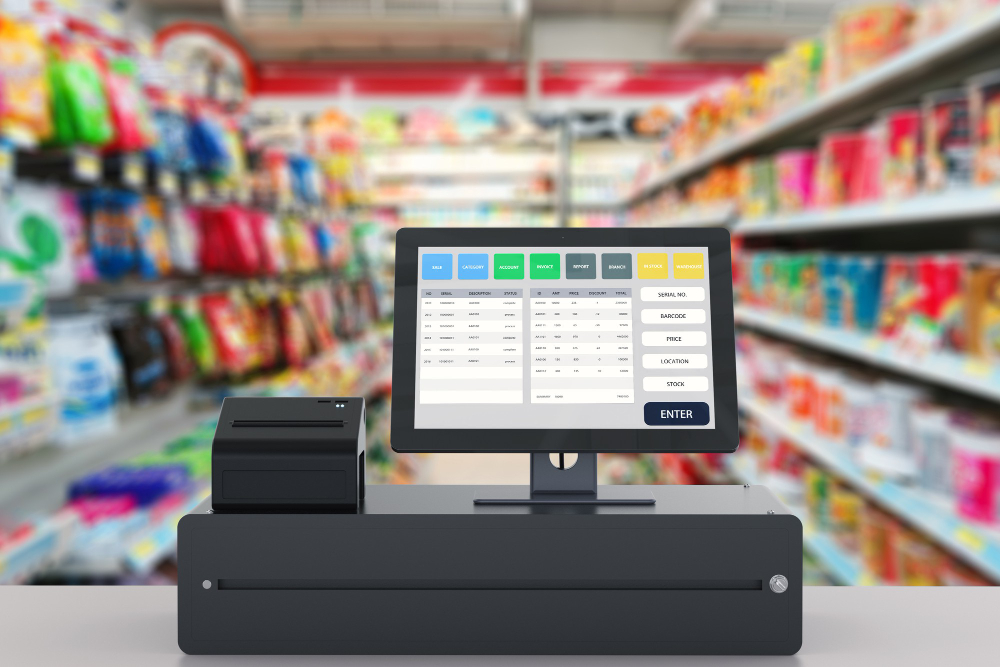
What is a POS system, and what are the benefits of using one for your business?
A point-of-sale system, often known as a POS system, is software and hardware that businesses use to process payments and monitor inventories. The popularity of cloud-based POS systems is growing due to their advantages over conventional cash registers.
Here are five ways cloud-based POS systems can benefit your business;
-Easy to set up and use:
A cloud-based POS system eliminates the need for additional hardware or software purchases. It takes only a few minutes to set up, and you can immediately use it.
-Accessible from anywhere:
The nicest thing about a cloud-based POS system is that you can access it from anywhere as long as you have an internet connection. That is ideal for businesses with various locations or mobile business owners.
-Affordable:
Generally speaking, a cloud-based POS system is less expensive than a conventional one. You can subscribe and pay monthly rather than shell out cash for pricey devices.
-Scalable:
Scalable cloud-based point-of-sale systems may expand along with your business. If your business grows, you may just add new products or locations to your POS system.
-Secure:
Many of the same security features, such as encryption, and fraud detection, that legacy Point of Sale (POS) systems offer are also available in cloud-based POS systems. Your data is also less likely to be lost or stolen because it is stored on a faraway server.
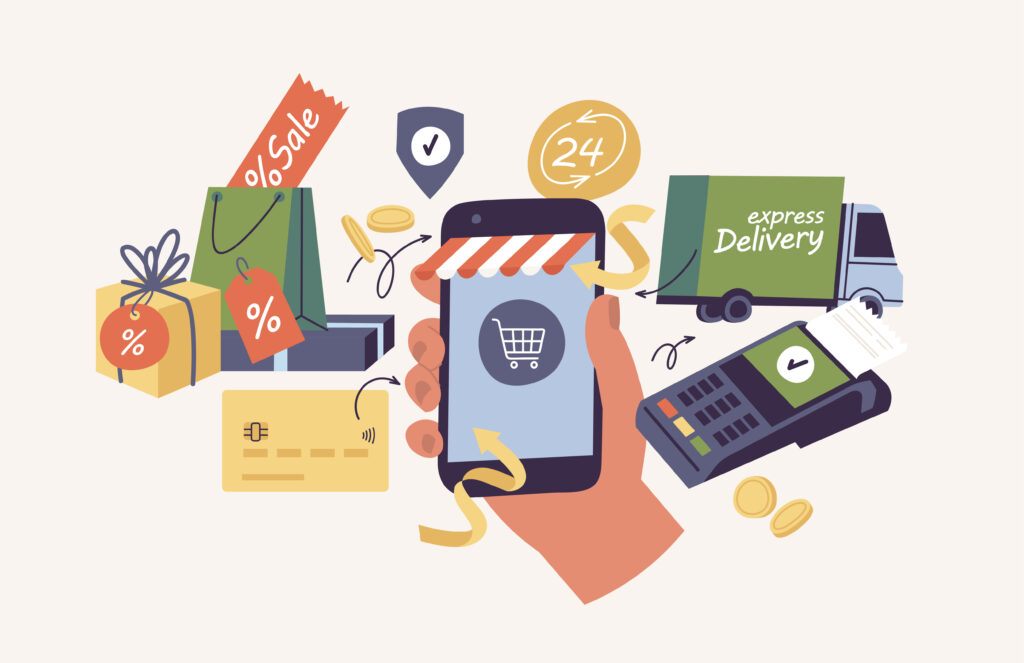
Let’s take a deeper look at the five key POS benefits below.
-Saves Managerial Time
POS systems are evolving from merely payment processing equipment to a hub for communication between your small business software applications, from payroll and scheduling to accounting and inventory control.
You can connect to other software programs using any POS system worth it’s salt. This procedure is commonly referred to as “integration” or using “integrated apps.”
Managers adore this function since it eliminates hours of effort. For instance, when purchasing and receiving inventory, you can have your POS automatically sync that data with your accounting program, saving you time (and preventing lost data).
-Improved Customer Experience
Every company should prioritize providing excellent customer service. More than 60% of customers, according to a Talkdesk survey, anticipate even better customer service in the wake of the COVID-19 outbreak. Additionally, more than 50% of Americans said they would pay more for superior customer service.
By investing in a cutting-edge POS system, you can enhance your client process:
Accommodate various payment methods:
E-wallet, contactless, and PayPal payment methods can speed up consumer transactions and help them avoid awkward situations.
Saved payment types:
This is an excellent technique for businesses like boutiques or service providers with tight ties with consumers because it saves clients’ preferred payment methods to returning customers’ POS, so they don’t need to take their wallets out.
Saved customer information:
Saving client data like loyalty program points or contact information is just as crucial as saving payments. Even a little gesture like addressing a customer by name can have a tremendous impact.
Self-checkout:
Self-checkouts and ordering kiosks are typically quicker and more convenient than conventional techniques, despite the dislike some people have for them. They might also enable you to cut labor expenses.
Checkout on the sales floor or at the table:
Customers don’t have to stand in line to be served while you get to them. Employees can ring sales transactions using mobile and tablet point-of-sale devices as soon as customers make a purchase decision on the sales floor.
Easy item lookup:
Customers value rapid updates on the cost, location, or availability of the goods they desire. Using POS systems, salespeople and cashiers can obtain this data with a few clicks or a simple barcode scan.
-Engage Customers on a More Personal Level
To understand the importance of customer engagement, think about how your business has been impacted. One benefit of more consumer dialogue is improved customer contact and service. 60% of customers were more inclined to become repeat customers after a personalized experience.
POS systems typically come with built-in marketing capabilities or the option to add marketing features and apps from third parties. A few of these include email, social media, SMS, and other channels. The best POS systems may consider a customer’s purchase history when delivering offers, discounts, or other marketing messages, going beyond merely adding a person’s name to an email.
-Boosts Revenue
A POS system improves the number of revenue streams for small businesses while enhancing the customer experience and operating swiftly to keep up with changing technology.
For instance, in addition to appointments and in-person sales, you can provide subscription services, mobile events, pop-up shops, catering, and pop-up shops. As a result, clients will find your company easier to access, boosting sales.
Here are a few examples:
- A salon that offers both cut and color services may use an internet store to market the hair care products it suggests.
- It might make sense for a fast-food business to start offering catering.
- To reach customers where they are, a vintage clothes company might easily put up booths at public gatherings or outdoor markets.
-Provides Accurate, Real-time Data
With a POS, you may automate the tedious task of manually measuring key performance indicators (KPIs) using spreadsheets and shared files. This frees you up to focus on other tasks that will benefit your company more, including assisting clients or developing fresh menu items.

In addition to daily sales, you can easily track the following;
Average Transaction Value (ATV)/Average Customer Spend (ACS):
How much money does each consumer spend with you on average when they shop?
Number of Transactions per Customer:
You use this information to identify devoted and repeat customers and the products they purchase.
Items Per Purchase:
How many items do they typically purchase in a transaction? Additionally known as units per transaction (UPT).
Sell-Through Rate:
A percentage represents the portion of a product sold during a particular time frame.
Sales Per Square Foot:
Your store’s average revenue per square foot of sales area.
Conversion Rate:
The Sales Conversion Rate measure contrasts the number of visitors to your website or physical location with the quantity who complete a purchase.
Cart Abandon Rate:
The practice of online customers who add products to their shopping carts and then log off before making a purchase.
Customer Retention Rate:
One of a store’s most crucial roles is to be able to keep its current customers and entice them to come back.
Gross Margin:
The portion of a business’s sales that go toward profit.
Sales Per Category:
Total sales for each product category at a retailer.
Sales Per Employee:
How much of the company’s profits each do employees contribute?
Returns:
What kinds of things are returned, and how many?

How does a POS system work at a small business?
Businesses can track sales and receive payments thanks to point-of-sale systems. The ease of use of the POS system is what makes it so important for contemporary businesses, as the information gathered helps to improve product development, streamline customer support, and expand the company as a whole.
a business’s cash register. With today’s fully digital POS systems, you can check out a customer from anywhere in the world. A POS program and an internet-connected device, like a phone or tablet, are all you need.
So what does a POS system do? Usually, it works like this;
-A customer decides to buy your product or service:
They might ask a salesperson to ring them up if you have a real shop. The price of the item might be checked with a bar code scanner. Using the Square Point of Sale and other POS systems, you can visually scan things with your device’s camera. This phase starts when a consumer has finished adding items to their cart and completes the checkout process in an online store.
-Your POS system calculates the price of the item:
Any applicable sales tax is included. The system then modifies the inventory count to reflect the item’s removal from stock.
-Your customer pays:
Your consumer can pay with cash, any kind of credit or debit card, rewards points, gift cards, or all of these. The transaction will then need to be approved by their bank, depending on the form of payment they select.
-The point-of-sale transaction is finalized:
You finally close a sale, and now is the time to shine. Once the payment is through, you send the consumer a receipt (either digitally or physically) and either deliver or ship the things they purchased.
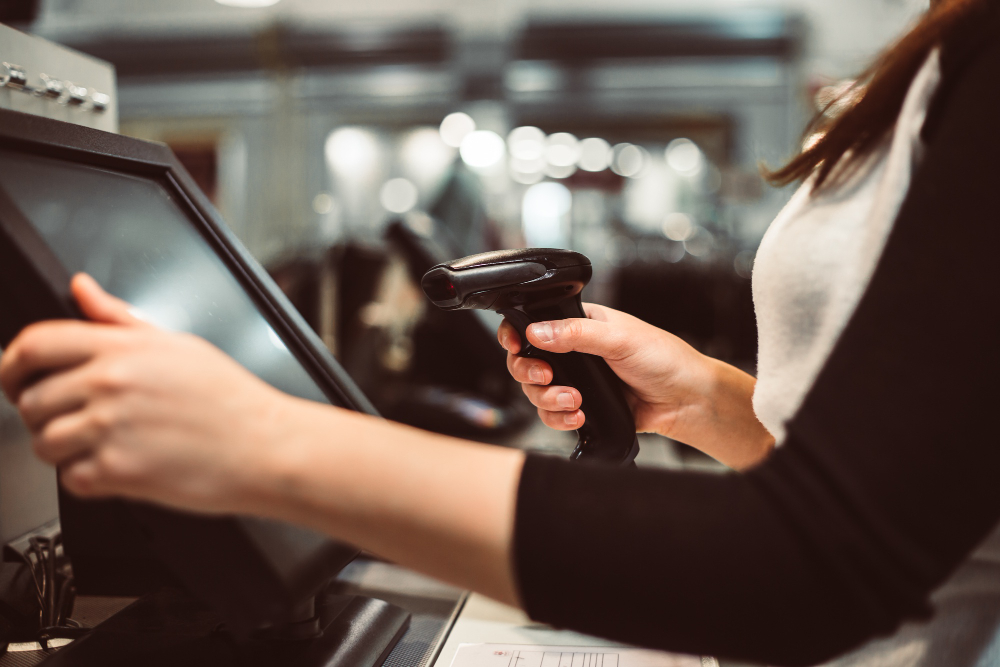
How to Choose the Best POS System for Your Small Business?
Knowing what resources are necessary to run and grow your business is crucial while looking for small businesses’ best point of sale (POS). An intelligent point-of-sale (POS) system for small businesses offers all the tools you need to manage administrative tasks more effectively.
Your business type will determine the kind of sales you make and the tasks you require assistance with. A busy cafe would require different things than a clothes store, and it makes logical that a plumber might need a different small company POS system than a fitness class.
Price (initial and ongoing), security, PCI compliance, and user usability should be the top considerations for any small business when choosing a point-of-sale system. To make an informed choice, you will be able to identify the traits to look for in a POS system thanks to this article.
When do you need a POS system?
A POS created for small businesses is probably a wise choice if you want to accept credit and debit card payments and require a straightforward system for tracking sales. Even small businesses can profit from a robust POS system.
It is more difficult to understand what you are selling without a reliable mechanism to electronically record each sale. In other words, making decisions based on facts is simpler with more knowledge about your business. Additionally, when you start, it’s important to appear trustworthy; a small business POS system can help with that.
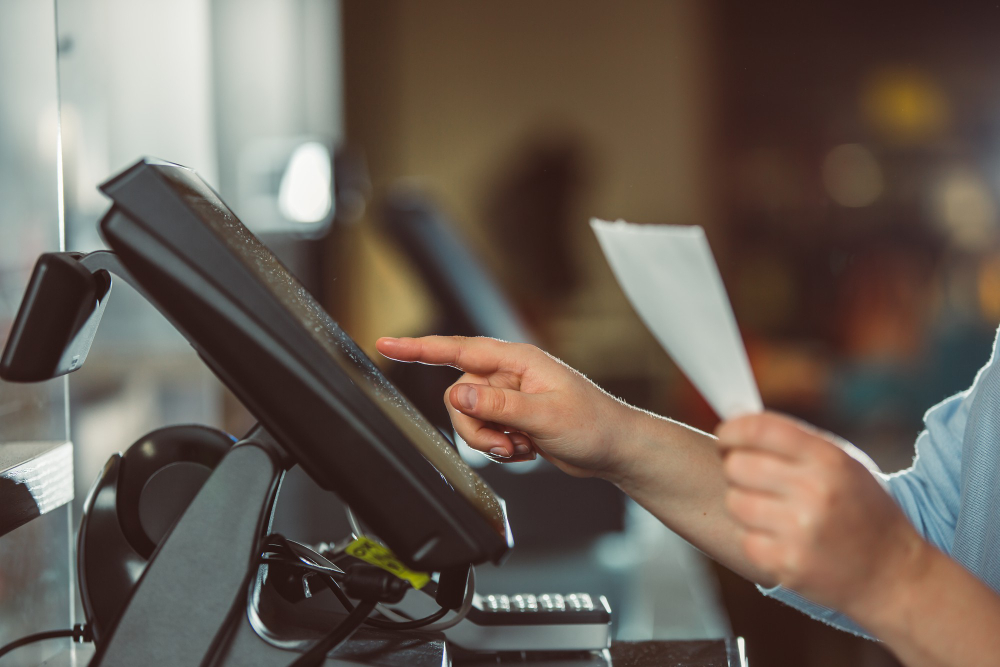
Essential factors to consider when choosing a POS system;
- the original time and financial commitment.
- Processing fees for payments, such as percentage of sales plus a charge per transaction
- recurring maintenance charges (e.g., PCI-compliance fee, chargeback costs)
- The price of equipment rental
- You’ll be required to pay the sum for TaxACT and any acquisition fees.
- If your organization deems your financial institution safe and secure, it will be PCI-compliant. This implies that you should adhere to PCI rules regarding securely managing client data, linking your systems, and processing payments.
- Ability to move
- Acceptance of EMV chip cards
- Apple Pay, Android Pay, and contactless cards are all supported by our NFC payment system.
- Options for POS software (e.g., invoices, storing customer data safely, inventory management, customer loyalty programs, appointment management)
- POS software features (e.g., invoices, storing customer data safely, inventory management, customer loyalty programs, appointment management)
Conclusion
It might be time to switch to a cloud-based POS system if your company still uses a cash register. Cloud-based POS systems have benefits that can help businesses run more smoothly and efficiently. We covered 5 ways that cloud-based POS solutions outperform traditional cash registers in this blog post. If you’re prepared to make the change, get in touch with us right now to learn more about the advantages of our cloud-based POS systems for your company.




